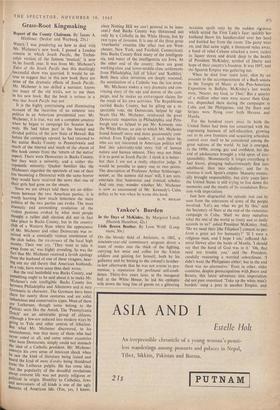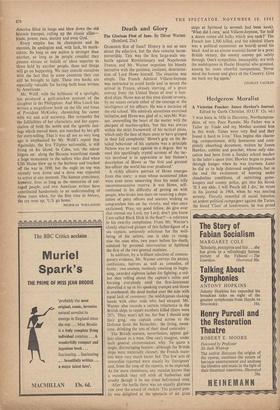Yankee's Burden
In the Days of McKinley. By Margaret Leech. (Hamish Hamilton, 42s.)
ON the bloody field of Antietam, in 1862, a nineteen-year-old commissary sergeant drove a team of mules into the thick of the fighting, carrying hot meat and coffee for the Union soldiers and gaining for himself, both by his gallantry and by hinting to the colonel's brother- in-law afterwards that he was not averse to pro- motion, a reputation for profound self-confi- dence. Thirty-five years later, at the inaugural ball at the White House, he led his epileptic wife down the long line of guests on a glittering
occasion spoilt only by the sudden rigidness which seized the First Lady's face; quickly her husband threw his handkerchief over her head and hustled her from the room. The party went on, and that same night, a thousand miles away, a band of rebel Cubans attacked a town, raided its liquor stores and drank deep to the health of President McKinley, symbol of liberty and hope of their country's freedom. It was 1897, and the Spanish Empire was guttering out.
When he died four years later, shot by an assassin to the accompaniment of a Bach sonata in the Temple of Music at the Pan-American Exposition in Buffalo, McKinley's last words were, 'Nearer, my God, to Thee.' But a quarter of a million other men were nearer their God, too, dispatched there during the campaigns in Cuba and the Philippines, and the Stars and Stripes were flying over both Havana and Manila.
For the hundred years since its birth the United States had been too concerned with the engrossing business of self-education, growing out to its own frontiers and acquiring articulate control over itself to be considered among the great nations of the world. At last it emerged, in the 1890s, strong, gay and confident, but the end of adolescence brought a wild spree of irre- sponsibility. Momentarily it forgot everything it had learnt, plunging indiscriminately first into adulthood, then into adultery; and for its mistress it took Spain's empire. Maturity eventu- ally brought responsibility, but sixty years later the United States is still trying to live down the memories and the results of its scandalous flirta- tion with imperialism.
Just how disgraceful the episode was can be seen from the utterances of some of the people involved, 'Let's see what we get by this,' said the Secretary of State at the end of the victorious campaign in Cuba. 'Shall we deny ourselves what the rest of the world so freely and so justly accords to us?' asked President McKinley. And, 'Do we need their [the Filipinos'] consent to per- form a great act for humanity?' If I were a religious man, and I hope I am,' reflected Ad- miral Dewey after the battle of Manila, '1 should say that the hand of God was in it."Oh, that need not trouble you,' said the President, candidly reassuring a worried subordinate. 'I didn't want the Philippines either; but in the end there was no alternative.' Even in other, older countries, despite preoccupations with .Boers and Boxers, this latest adventure into imperialism did not pass unnoticed. 'Take up the white man's burden,' sang a poet in another Empire, and
is lungs and blew down the old calling up the classic allies- ce, destiny and even God.
e has its champions and its logists and, with luck, its muck- as one nation is stronger than rg as its people consider they or beliefs or' ideas superior to mother people, these sad things ening. We may console ourselves hat in some countries they can to light. These two books are ble for having both been written
America filled i historic trumpet trade, power, ra Every empir enemies, its apo rakers. So long another, so lor possess virtues those held by a will go on happ with the fact t still be brought especially valua by Americans.
Mr. Wolff, w has produced slaughter in the written a magni of President M with wit and a the fallibilities ciation of both ings which mov for story-telling ago is emphasi Aguinaldo, the living on his i, lingers on: alor a huge monum USS Maine blel off the war in recently torn d to arrive at any however, lives r raged people, a contributed han those years wh( the cry went up ith the brilliance of a spotlight, a guilt-stricken account of the Philippines. And Miss Leech has ficent book on the life and times McKinley, chronicling his career rid accuracy. Her sympathy for of her characters, and her appre- the noble and the ignoble feel- ed them, are matched by her gift That it was all not so very long sed by Mr. Wolff's report that first Filipino nationalist, is still Bland. In Cuba, too, the odour ig the Havana waterfront stands :nt to the sailors who died when v up in the harbour and touched 1898, but the eagle on top was own and a dove was expected moment. The human conscience, is long as the memories of out- aid two American writers have idsomely to an understanding of for the first time in history? , 'U.S. go home.'
NICHOLAS WOLLASTON











































 Previous page
Previous page